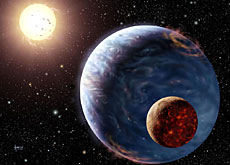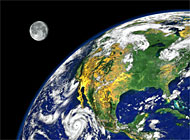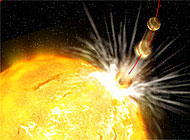Geochemists unravel Earth’s secrets

Some of the secrets of the universe look set to be revealed this week at an international conference in Davos.
About 1,800 geochemists from around the world are in the Alpine resort for the 12th annual Goldschmidt conference.
They are to present hundreds of new scientific papers on topics as varied as the formation of planets, climate change and the working of the human body.
“There’s a large range of exciting new discoveries being made with geochemistry today,” said Professor Alex Halliday from the Federal Institute of Technology in Zurich.
“New techniques are allowing us to use chemistry to explore the Earth, the environment, the origins of the solar system and even our own human body in a way that’s totally unparalleled in the history of science.”
Past and present
Isotopic geochemistry is based on the fact that isotopes – atoms of the same element – have different numbers of neutrons.
The relative proportions of the different isotopes of an element or isotopic composition provides important information about past and present geological, environmental and planetary processes.
“We can use elements and their isotopes to tell us about things as different when an object formed or when a process occurred, the temperatures at which that process occurred or where something came from.” Halliday told swissinfo.
Radioactive decay
Some isotopes vary in their abundance as a result of radioactive decay. Measuring small differences in tungsten isotopic composition has helped determine the age of the moon.
Trailblazing research into temperature in ancient times at the Department of Earth Sciences in Zurich is based on the fact that different isotopes of oxygen evaporate or participate in reactions at different rates depending on temperature.
Isotopic variations can sometimes be used as a kind of fingerprint of where an object formed or its prehistory. By studying his teeth and bones, it has been possible to determine the approximate locations in Europe where Ötzi, the Neolithic Ice Man, grew up and migrated.
Doubled in size
The Goldschmidt conference is an annual meeting, which alternates in venue between the United States and Europe. It is organised by the European Association for Geochemistry and the Geochemical Society.
The conference is named after Victor Moritz Goldschmidt, who was born in Zurich in 1888 and is recognised as the founder of modern geochemistry.
“It’s geared towards geochemists from all walks of life,” said Halliday, who heads Zurich’s Institute for Isotope Geochemistry. “Those who use the chemistry of the elements to study subjects like the origin of the solar system and the planets right the way through to people who use chemistry to study ground water or anthropology.”
The Goldschmidt medal – the highest honour in the field – is awarded annually to a scientist who is considered to have made an outstanding achievement in the field of geochemistry over the past ten to 20 years. This year’s winner, Professor John Hayes from the United States, is to give a keynote address on Tuesday.
Some of the key players in geochemistry today are based in Switzerland, including the current president of the Geochemical Society and the vice-president of the European Association for Geochemistry.
Attendance at this year’s conference has exceeded all expectations.
“There’s a lot of excitement about the field right now,” said Halliday. “Switzerland has become quite strong in this field and I think being centrally placed within Europe and in rather an attractive setting like Davos with good conference facilities is one of the reasons why the meeting has doubled in size this year.”
by Vincent Landon

In compliance with the JTI standards
More: SWI swissinfo.ch certified by the Journalism Trust Initiative


You can find an overview of ongoing debates with our journalists here . Please join us!
If you want to start a conversation about a topic raised in this article or want to report factual errors, email us at english@swissinfo.ch.